► Nissan’s electric plans revealed
► New Micra, Leaf and Juke by 2026
► Wider plan to become profitable
Nissan’s grand electric plans are under way. As the Japanese giant wrestles with its future and figures out how to make itself profitable, its European line-up will be revitalised with three new EVs by the end of 2026.
The brand has confirmed that its Leaf makes a return for a third generation, while an all-new Micra will synergise with the Renault 5 and be built in the same factory. On top of that, its Juke crossover will be revitalised by the end of 2026, using heavy design inspiration from the wild Hyper Punk concept car.
‘The renewal of Nissan’s European line-up is the realisation of our bold plan to electrify our range in Europe,’ says Leon Dorssers, regional senior vice president for sales and marketing. ‘All the new models will share common Nissan DNA: striking design, technical innovation and intuitive technology.’
This is all part of Nissan’s enormous model offensive across the globe, which has been nicknamed The Ark by former Nissan president and CEO, Makoto Uchida.
What is The Ark?
The Ark is described as Nissan’s bridge to its ‘Ambition2030’ plan, which describes a 60 per cent electrified vehicle mix by 2030. Uchida, said in 2024 that ‘the Ark plan shows our path to the future,’ and that it will ‘provide us with the firm foundation we need to bridge to our Ambition2030 vision.’
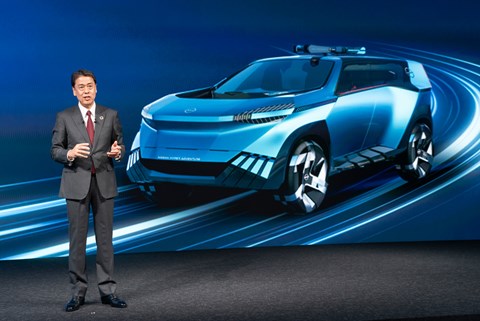
The new model offensive will include everything from new-generation kei cars for Japan to pickups for North America and a reinvigorated Infiniti line-up. What’s more relevant for Europe, though, is the aim to launch ‘six all-new models’ by 2030 to achieve a 40 per cent EV sales mix in the region.
Part of that strategy is the £3bn investment in the Sunderland plant to produce new-generation Qashqai and Juke, as well as the third-generation Leaf.
Nissan electric car expansion: the detailed plan
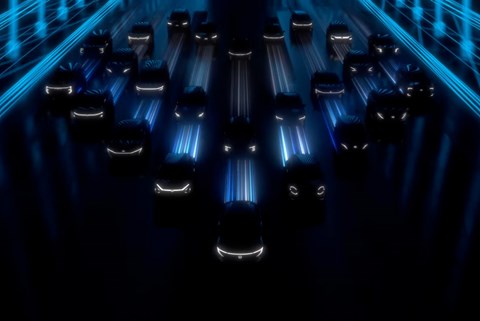
That Ark plan comprises 30 new models across the Nissan and Infiniti line-up, of which 16 will be electrified. Uchida hinted at the scale of Nissan’s ambition in September 2023, when he visited the Nissan Design Europe office for its 20th anniversary. The event was centred around the unveil of the Nissan Concept 20-23 – but it was also an opportunity for the company to reveal more about its electric strategy.
‘Europe has been leading the switch to EV. We have sold more than 1 million EVs, and a third of those have been in Europe,’ the boss said. ‘Today, we are here to say that from this point onward, every single new Nissan model launched in Europe will be fully electric.’
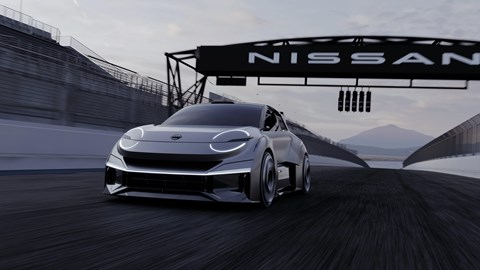
Despite the UK’s move to a 2035 ban on ICE cars, Nissan’s Ambition 2030 vision remains unchanged. It plans to make the switch to full electric by the end of this decade, and that means even the high-volume cash cows such as Qashqai and Juke will be making the switch to full battery electric vehicle (BEV).
Crucial to the switch will be advancements in battery technology – both in lithium-ion and solid-state – as well as serious development of the company’s battery plant in Sunderland. Lower costs, higher volumes and improved energy density will be key to Nissan’s EV plans, and you can read more about each of those below.
Nissan’s Sunderland factory: a new EV hub
Speaking at the same event, Nissan’s SVP for R&D David Moss explained just how Sunderland’s existing battery plant is being augmented to cope with Nissan’s electric vision: ‘The original Leaf plant is 1.8 Gigawatts, but this is a nine-gigawatt plant.’
The new battery factory will be around five times the size as before and is already being constructed with Nissan’s partner AESC. Moss gave no timeframe for completion, but said it’d be ready for a forthcoming EV.
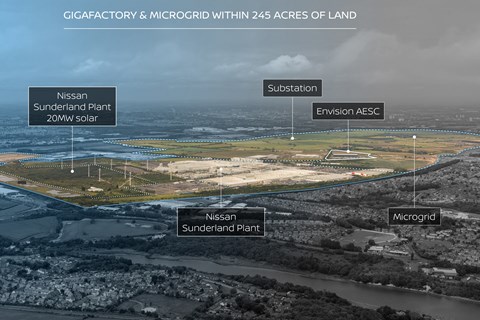
The large electrification project will create 6200 jobs for Nissan, including 909 new roles at the Sunderland plant to manufacture this upcoming EV.
Moss also assured CAR that Sunderland’s numbers will remain competitive throughout the transition to EV-only, and there are even options to expand: ‘When the conditions are right and we decide that we need to bring more electric vehicles to market we’ve got a scalable facility here,’ he said.
‘We can just basically build another bit next to it, and it takes on all those advantages of how you make the cathode and how you make cells.’
ASSB vs lithium-ion
In addition to more volume, Nissan will also leverage new solid-state technology. ‘We can effectively double the power density,’ said Moss about Nissan’s ASSB tech. ‘You can take the same size battery with the same charge, or you can halve its size and still have the same amount of power.’
Charging, the next key metric for consumers according to several brands, will also be greatly improved with solid-state tech: ‘You can charge this thing really quickly because when you’re charging the battery today, the liquid is your limiting point because it boils,’ Moss explained. ‘We can speed up that charging three times [with solid-state tech].
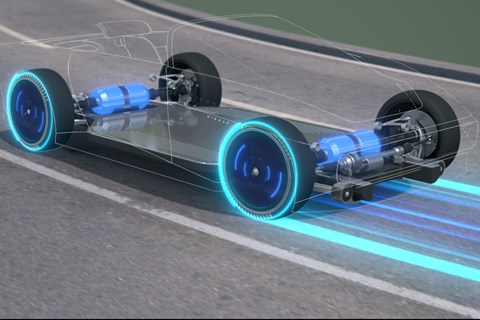
The brand is scaling up its solid-state technology now with a view to be on the consumer market – somewhere – by 2028. Today’s lithium-ion battery tech remains a key technology, though.
‘We still believe lithium-ion battery technology has a lot to do and we’re currently working towards a cobalt-free battery, which actually has very good power density,’ confirmed Moss. ‘But it actually does that at a smaller cost.’ To be more precise, Nissan intends to lower the cost of its cobalt-free lithium-ion cells by 65% before 2028.
Lithium-ion or ASSB?
Several manufacturers are now giving customers a choice of battery chemistry within the same platform, but that’s not a direction Nissan seems keen on following. That’s partly because of the extra developmental work involved, but also because of the huge advantages solid-state will offer customers anyway. ‘It has those three different levels of advantage,’ said Moss when talking about ASSB.
‘If you see an advantage, which allows you to do something to help the customer, of course you’ll consider it, but I’m not sure that will necessarily be the case with solid-state [and lithium-ion on the same platform].
What are Nissan’s new electric concept cars?
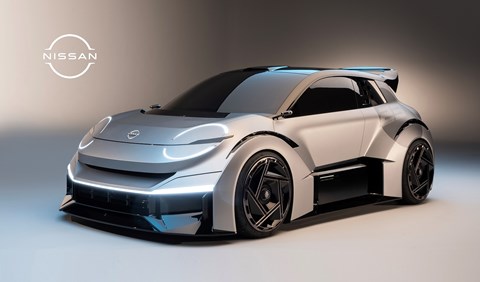
In addition to the Micra-previewing Concept 20-23 pictured above, Nissan has already teased how its upcoming electric vehicles will look with four new concept cars.
They were previewed at the brand’s Ambition 2030 event back in November 2021 – and the company described one of them as a ‘near-future EV.’ At the same time, Nissan announced it will spend two trillion yen (around £11 billion at the time of writing) on its future production EVs and it has plans to introduce its first solid-state battery pack in 2028.
Nissan Chill Out concept
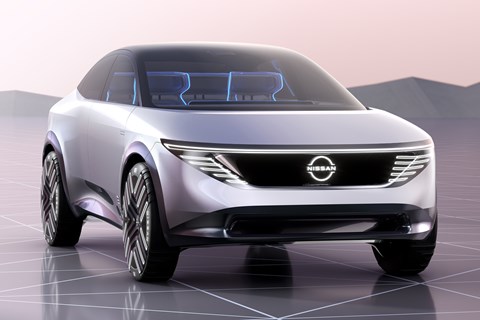
The Chill Out is what Nissan called its ‘near-future EV.’ When it was revealed, that was a thinly veiled hint that this concept is the precursor to the next-generation Nissan Leaf. It’s based on the same CMF-EV platform as the Ariya and the Renault Megane E-Tech Electric and, while Nissan hasn’t released any performance specifications, the firm says the concept features its E-4orce all-wheel drive system, plus ‘advanced safety technology and a productive, comfortable interior space.’
Nissan Max Out concept
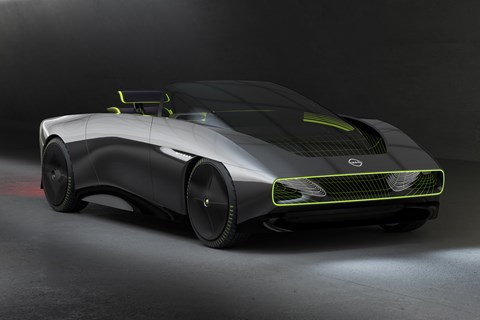
Nissan hasn’t forgotten about its performance cars just yet. The Max Out concept offers a glimpse at how a low-slung, convertible Nissan sports car could look once the company has properly moved into its electric era. Again, the brand hasn’t confirmed any performance specs, but it’s likely driven by the company’s range-topping 389bhp dual-motor powertrain.
Nissan Surf Out concept
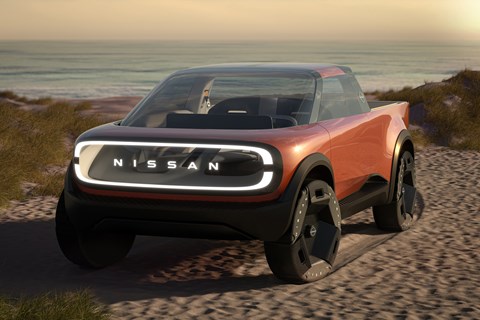
The Surf-Out is an off-road-ready two-door pickup that Nissan says has external outlets that can be used to power tools and electrical applicances, like Hyundai Motor Group’s V2L technology. It also has a transparent front grille and an unusual light bar mounted on the tailgate that can display emojis to following traffic.
Nissan Hang Out concept
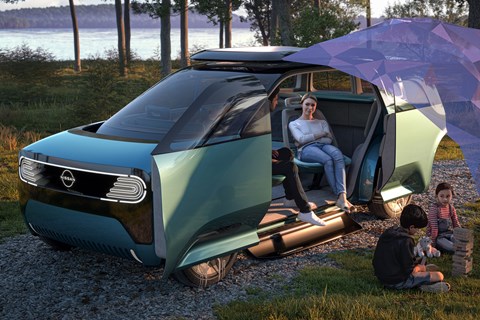
The Hang Out is the most practical concept of the bunch. It looks like a thoroughly modernised Renault 4 to our eye (do remember, the French brand is revitalising the Renault 4 as an EV) – and Nissan says it was designed to make us rethink how a car interior should look. It’s all about maximising space and modularity.